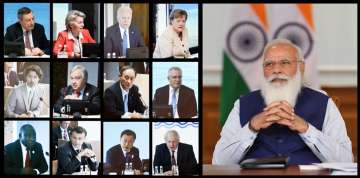India natural ally for G7, partners to take on global challenges: PM Modi | Key Highlights
Prime Minister Narendra Modi on Sunday said India is a natural ally for the G7 countries in defending the shared values from a host of threats stemming from authoritarianism, terrorism and violent extremism, disinformation and economic coercion.

Prime Minister Narendra Modi on Sunday said India is a natural ally for the G7 countries in defending the shared values from a host of threats stemming from authoritarianism, terrorism and violent extremism, disinformation and economic coercion. In a virtual address at a session on 'open societies and open economies' at the G7 summit, the prime minister highlighted India's civilisational commitment to democracy, freedom of thought and liberty, according to the Ministry of External Affairs (MEA).
Modi also highlighted the revolutionary impact of digital technologies on social inclusion and empowerment in India through application such as Aadhaar, Direct Benefit Transfer (DBT) and JAM (Jan Dhan-Aadhaar- Mobile) trinity.
In his remarks, the prime minister underscored the vulnerabilities inherent in open societies and called on tech companies and social media platforms to ensure a safe cyber environment for their users, additional secretary (economic relations) in the MEA P Harish said at a press conference.
"The prime minister's views were appreciated by other leaders in the gathering," he said.
Harish said the G7 leaders underlined their commitment to a free, open and a rules-based Indo-Pacific and resolved to collaborate with partners in the region. India's participation at the G7 sessions reflected understanding within the bloc that resolution to "the biggest global crisis of our time" is not possible without India's involvement and support, he said, in a reference to the coronavirus pandemic. He said India will remain deeply engaged with the G7 and guest partners on all major issues, including health governance, access to vaccines and climate action.
The senior MEA official also said that there was widespread support at the G7 deliberations for text-based negotiations on a proposal by India and South Africa for patent waiver on Covid vaccines.
The Group of Seven (G7) comprises the UK, Canada, France, Germany, Italy, Japan and the United States. As chair of G7, the UK invited India, Australia, South Korea, South Africa to the summit as guest countries. The leaders of the world's advanced economies held a summit in Cornwall in the UK from June 11-13. It is for the first time the leaders of the grouping met in person since the coronavirus pandemic began.
READ MORE: G-7 leaders agree to challenge China's non-economic practices, human rights abuses
G7 to provide 1bn COVID vaccines to poor countries by end-2022, says UK PM
Prime Minister Boris Johnson on Sunday marked the conclusion of the UK-hosted G7 Summit in Cornwall with the announcement that world leaders have pledged over 1 billion doses of COVID-19 vaccines for the world's poorest countries by the end of next year.
Johnson declared the summit a success with pledges for “building back better and greener” from the pandemic and achieving the “greatest feat in medical history” of vaccinating the world at a press conference to mark the end of the three-day summit, attended by the leaders of US, Canada, France, Germany Italy, Japan, alongside Australia, South Africa and South Korea as guest nations, with India joining virtually.
“Leaders have pledged over 1 billion doses – either directly or through funding to COVAX – that includes 100 million from the UK, to the world’s poorest countries – which is another big step towards vaccinating the world,” said Johnson.
He highlighted the special role of the UK-developed Oxford/AstraZeneca vaccine, which is also being produced by the Serum Institute of India as Covishield.
G-7 leaders agree to challenge China's non-economic practices, human rights abuses
Leaders from the Group of Seven wealthy democracies say they will work together to challenge China's “non-market economic practices” and to call on Beijing to respect human rights in Xinjiang and Hong Kong.
US President Joe Biden had wanted to persuade fellow democratic leaders to present a more unified front to compete economically with Beijing and strongly call out China's “nonmarket policies and human rights abuses.”
In the group's communique published Sunday, the group said: “With regard to China, and competition in the global economy, we will continue to consult on collective approaches to challenging non-market policies and practices which undermine the fair and transparent operation of the global economy.”
The leaders also said they will promote their values by calling on China to respect human rights and fundamental freedoms in Xinjiang, where Beijing is accused of committing serious human rights abuses against the Uyghur minority, and in the semi-autonomous city of Hong Kong.
READ MORE: 'Doing this to save lives, end pandemic': G-7 nations pledge 1 billion vaccine doses for world